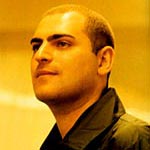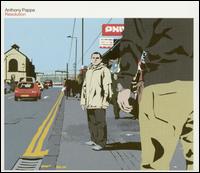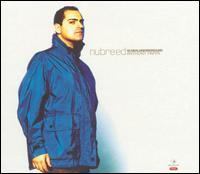

Courtesy of Anthony Pappa

Systems

Boxed
A FIRESIDE
CHAT WITH ANTHONY PAPPA
Anthony Pappa? You may not know him now, but you can bet your ass you'll
know him tomorrow. Pappa is as ESPN anchors coined it, "el fuego."
Playing to packed houses at Metro, doing a residence at Twilo (no longer
in existence), and sets for Ministry of Sound is enough for an man's plate
and Pappa's is full. His progressive beats are conquering all over and
if you check his shit out, you will hear why. Pappa sat down with the
Roadshow on a brief hiatus before gigs and we talked about being a DJ
and all the perks and crap that comes with it, as always, unedited and
in his own words.
FRED JUNG: Let's start from the beginning.
ANTHONY PAPPA: I started playing the drums when I was the age of four.
My father was in a band when I grew up so I grew up around music as a
kid. So that is how I got into music and from playing the drums, I started
buying records and started to get some turntables and figured how to mix
them together. I did that when I was thirteen and started doing my friends'
birthday parties and things like that. And just kind of took it from there
really.
FJ: What were some of things you were grooving to back then?
ANTHONY PAPPA: It was mainly like funk, disco, and then like in the late
Eighties, house music kind of started and from then on, I evolved into
house. And as the times have gone on, I have just progressed with the
times and just kept up with whatever was on at the time. But at the start,
it was definitely more disco.
FJ: So becoming a deejay was a no brainer?
ANTHONY PAPPA: Yeah, I really was really into it. To start at thirteen,
I used to spend all my fucking money on records. I got a job after school
just washing cars, just to save that money to buy turntables. So I was
really passionate by it. I never knew how far it was going to go, but
I knew that it was something that I wanted to do. I kind of saved everything
I could at the time. You get kind of hooked into it. Once you start buying
records and getting into it, you can kind of get hooked a bit. I was hooked
instantly. Basically, I just turned into a mad, mad, passionate deejay
and a vinyl junkie who has to have everything.
FJ: Do you still go scouring for vinyl?
ANTHONY PAPPA: Oh, yeah, definitely. I mean, I don't have a lot of time
to actually go to the stores. I try to pop in sometimes, but I shop from
like five different record stores. I just get mail order from all these
different shops because I don't want to miss anything.
FJ: With all the beats you must have already, is there anything you are
still jonesing for?
ANTHONY PAPPA: Because I have been buying records for thirteen years,
my collection is really big now. I've got like over ten thousand records.
It is really hard for me to buy anything now. I haven't bought anything
in the past five years that I haven't had already that I really wanted.
In your first four to ten years of having a record collection, you kind
of do all of that. You chase and hunt and you find things. I think I have
found everything that I have wanted now. I just keep updating myself every
week, just an update.
FJ: How do you go about deciding what set to play?
ANTHONY PAPPA: It depends on the city. It depends on the people at the
clubs. To be honest, I play from house to progressive house through to
trance. I even play some breakbeat stuff as well. My ideal set would be
like to play a five or six hour set and play it all from one side to the
other. In a two hours set, it depends. If I am on early, I will kind of
hold back a bit and save it up for the next person who might play a bit
harder and try and bring them out up a bit, but the way I do that depends.
For example, at Twilo tonight, I can imagine that it is going to be quite
cool and people are going to dress quite a bit chunky and New York is
a bit more tougher house, do you know what I mean?
FJ: You are preaching to the choir.
ANTHONY PAPPA: I will play some trancy stuff, but only if I am playing
long enough and they allow me to get there. I enjoy the challenge of playing
to different people. I've got my sound and my style and it is always me,
even though I change my set at different clubs, it is always me. Everywhere
is good for me, but I like deejaying in Budapest and Singapore. Mexico
is really good. I just played in Tokyo on the weekend and China and that
was really good.
FJ: All that traveling has to be taking a toll?
ANTHONY PAPPA: Yeah, but I am really used to it. I've been twice around
the world in the last four weeks. I don't really get jetlagged. I'm really
good with it actually. It is just part of my life now. I just adapted
to what I do. Friday, I was in Hong Kong and China and Saturday, Sunday,
Tokyo. I got home Sunday. I was home for two days and now I am here (New
York). And tomorrow, I am in Canada. Friday, LA and Saturday, Washington.
Back to England, Sunday, Ireland, Monday night, London, Tuesday. It is
just a way of life for me now. I enjoy it. It can be tiring, but you have
just got to be ready for it, I think. I just feel ready for it right now.
FJ: You must have enough miles to go to the moon.
ANTHONY PAPPA: Definitely (laughing).
FJ: Obviously, the scene in the UK has been thriving for many years, Europe
is off the charts, Southeast Asia getting into it, and the States have
it seeping into the mainstream, but where is one destination that you
never imagined would have a buzzing scene?
ANTHONY PAPPA: Um, Iceland.
FJ: Iceland?
ANTHONY PAPPA: Yeah (laughing), you know what I mean? Reykjavik, the main
city in Iceland and it was really cool. It was a really good party. I've
been to Norway and South America, but that is more obvious, I guess. Costa
Rica and Central America, I've done a really good party there. Beijing
on the weekend in China, I never thought that would have been another
one. Honestly, Fred, it is everywhere. Trance music has grown so much
that it is everywhere now. Obviously, it is bigger in some places than
in others, but the other places are catching up fast.
FJ: You have been doing this for a while now, what do you feel are the
reasons behind the sudden growth of electronica?
ANTHONY PAPPA: It always has been there from day one. I think the underground,
if you do something long enough, people catch on to it. At some point,
it is going to have a little bit of commerciality to it. It gets a little
bit commercial and then the underground kind of reinvents itself again.
It has just evolved over about ten years or so now. And more and more
people are getting into dance music. You can just tell when you walk down
the street. All these shops are always playing dance music. Television
commercials have all this dance music in the background. The media are
getting more and more behind it, which just goes to show that it is getting
stronger and stronger. The stronger it gets, the more people it appeals
to. It is not this little thing that everyone thought was going to come
and go. It is actually just getting bigger and bigger now.
FJ: Now, it is spawning a culture within itself, where it is not simply
the music, but also there is a whole culture feeding off it and a look.
It has certainly become a juggernaut.
ANTHONY PAPPA: Yeah, you don't have to have a certain look to be into
dance music, but house definitely has its own culture. The whole clubbing
scene in general, from what people wear to how they look, to what they
listen to, to where they go, the CDs that they buy, it is one huge industry
now. Definitely, definitely. It is not just going to a club to hear a
deejay. It's more than that now, isn't it?
FJ: Let's talk about your volume for the Global Underground series.
ANTHONY PAPPA: Basically, I just rang as many people as I knew around
the world, friends and record labels, just chasing and researching as
much new music as possible because I had to do the album about three months
prior to its release and I still wanted the album to sound fresh when
it was released and not sound like everything that was out already and
still to this day, there are tracks on the album that haven't been released
yet. So I just did that through people I know, that I've met through deejaying,
record companies, record labels. I just got a bunch of stuff in the mail
and this was the best I could find from around the world. I narrowed it
down to twenty-four tracks and somehow try to mix it to the best of my
ability and bang, an album was created.
FJ: Every deejay that I have spoken with has mentioned how licensing really
hampers what they do.
ANTHONY PAPPA: It does. It depends on your budget as well. If it is a
big, major company then they are going to license pretty much any track
you want because whatever track it is going to be, they can afford to
get it licensed for your compilation. But some deejays do compilations
and they do it for small companies or small independent labels, who have
only got like two, three hundred dollars to spend on each track and that
kind of limits the deejay then to what tracks they can choose because
they can't get the bigger tunes that they wanted to use because that record
label didn't want to give it to them at that price. Then you have got
the war within the deejays. At the time I was doing mine, John (John Digweed)
and Sasha were doing theirs and someone else was doing another CD and
so each deejay was chasing similar records and so it is bit of a competition
and a bit of a war. It gets a bit nasty sometimes about who ends up using
what track. It also works itself out and everyone ends up getting what
they want so, yeah, I'm happy with my album, definitely.
FJ: What does a deejay like to see from his or her audience?
ANTHONY PAPPA: I just like to see a full dance floor, people that really
appreciate the music, and they are not there because it is cool to be
there or they have been told to be there. They are there because they
want to be there and they actually appreciate the music. I hate playing
in clubs where you have a really nice looking crowd, but they just stand
around and not want to do anything. They don't want to dance because they
think they are too cool for that. Seeing that sucks. I just like seeing
people having a good time for the right reasons and getting into the music.
And the best buzz is playing to those people, being behind the decks and
power by it and playing your music as well. The scene is getting bigger
and bigger. You can tell by John and Sasha and Twilo. People are getting
more and more into it.
FJ: That's healthy for everybody.
ANTHONY PAPPA: It is. It is good for everyone. It is growing and there
is plenty for room for it to grow as well.
Fred Jung is the Editor-In-Chief and can't believe the fat chick on TV
is Ozzy's offspring. Comments? Email
Him